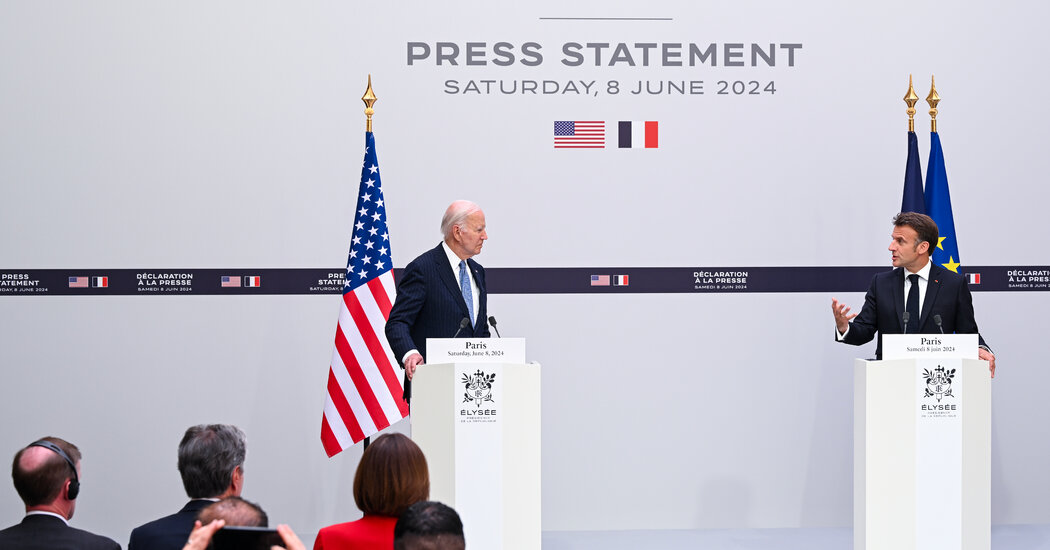President Joe Biden and French President Emmanuel Macron stressed on Saturday that they are closely aligned on global issues, including the war in Ukraine, even as they expressed sharply different views on the fighting between Israel and Hamas in Gaza.
In a brief appearance before reporters at the end of two days of D-Day commemorations and hours before a lavish state dinner at the Elysee Palace in Paris, the two presidents declined to take any questions and papered over their apparent differences on the Middle East. Instead, they both stressed the enduring power of the U.S.-France partnership on climate, the economy, European security and cultural ties.
“Today, I proudly stand with France in support of freedom and democracy around the world,” Biden said after the two men concluded closed-door talks at the Elysee Palace.
“We have a common vision of this war in Ukraine,” Macron noted, adding that he hoped “all G7 countries will agree to a $50 billion solidarity fund for Ukraine,” referring to the G7, the abbreviation for the Group of Seven.
The French president's comments suggest the two leaders have reached a consensus on a plan to provide Ukraine with up to $50 billion in advance loans using proceeds from frozen Russian assets. U.S. officials had said before the meeting that France was the main opponent of the plan and they hoped to win support during the Paris trip.
On Gaza, Macron noted that his government supports an Israeli ceasefire proposal, which Biden strongly supports. But the French president also directly asked Israel to step up its efforts to provide aid to Palestinians suffering from government bombardment.
“It is unacceptable that Israel does not open all its checkpoints to humanitarian aid, as the international community has been asking Israel to do for months,” Macron said. He said Israel's actions in Gaza “should stop.”
France supported the ICC's decision to issue arrest warrants for Israeli Prime Minister Benjamin Netanyahu and Gaza Hamas leader Yahya Sinwar. Biden, in contrast, condemned the action, saying it was an unfair comparison between the two leaders. France also voted at the United Nations in May to admit Palestine as a full member of the organization, something the United States opposed.
Neither Biden nor Macron mentioned any disagreements regarding the Israel-Hamas conflict.
In a break from tradition when the U.S. president meets with foreign leaders, French and American journalists were not allowed to ask questions after Saturday's statement, which lasted a total of 16 minutes. In most cases, the two leaders allowed journalists from their respective countries to ask at least two questions.
White House national security spokesman John Kirby declined Saturday to explain why that was not the case.
“That's what was arranged,” he told reporters earlier this week. “As you know, any bilateral meeting, or in this case a state visit, is agreed upon by both parties. We decided as we were discussing and planning this visit that they would do this: They would come out and make a statement to the media.”
Despite the tensions, Macron’s warm embrace of Biden was in stark contrast to the mood during President Trump’s visit to the U.S. in November 2018, when Trump accused Macron of being “very rude” in an online post just minutes before Air Force One landed in Paris. Macron gave a speech attacking nationalism weeks after Trump declared himself an American nationalist.
In contrast, Macron on Saturday praised Biden as a “partner who respects Europeans,” a line that sounded different from Trump, who often disparages European leaders. “Thank you for standing by Europe,” Macron said.
“You've become a good friend of mine,” Biden responded.









